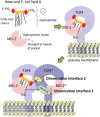Towards clinical applications of anti-endotoxin antibodies; a re-appraisal of the disconnect
- PMID: 24351718
- PMCID: PMC3873702
- DOI: 10.3390/toxins5122589
Towards clinical applications of anti-endotoxin antibodies; a re-appraisal of the disconnect
Abstract
Endotoxin is a potent mediator of a broad range of patho-physiological effects in humans. It is present in all Gram negative (GN) bacteria. It would be expected that anti-endotoxin therapies, whether antibody based or not, would have an important adjuvant therapeutic role along with antibiotics and other supportive therapies for GN infections. Indeed there is an extensive literature relating to both pre-clinical and clinical studies of anti-endotoxin antibodies. However, the extent of disconnect between the generally successful pre-clinical studies versus the failures of the numerous large clinical trials of antibody based and other anti-endotoxin therapies is under-appreciated and unexplained. Seeking a reconciliation of this disconnect is not an abstract academic question as clinical trials of interventions to reduce levels of endotoxemia levels are ongoing. The aim of this review is to examine new insights into the complex relationship between endotoxemia and sepsis in an attempt to bridge this disconnect. Several new factors to consider in this reappraisal include the frequency and types of GN bacteremia and the underlying mortality risk in the various study populations. For a range of reasons, endotoxemia can no longer be considered as a single entity. There are old clinical trials which warrant a re-appraisal in light of these recent advances in the understanding of the structure-function relationship of endotoxin. Fundamentally however, the disconnect not only remains, it has enlarged.
Figures




Comment in
-
Comment on Hurley, J.C. Towards clinical application of anti-endotoxin antibodies; a re-appraisal of the disconnect. Toxins 2013, 5, 2589-2620.Toxins (Basel). 2014 Apr 11;6(4):1362-3. doi: 10.3390/toxins6041362. Toxins (Basel). 2014. PMID: 24732205 Free PMC article. No abstract available.
-
Response to John G. Brock-Utne. Comment on Hurley, J.C. Towards clinical application of anti-endotoxin antibodies; a re-appraisal of the disconnect.Toxins (Basel). 2014 Apr 11;6(4):1364-5. doi: 10.3390/toxins6041364. Toxins (Basel). 2014. PMID: 24732206 Free PMC article. No abstract available.
Similar articles
-
Response to John G. Brock-Utne. Comment on Hurley, J.C. Towards clinical application of anti-endotoxin antibodies; a re-appraisal of the disconnect.Toxins (Basel). 2014 Apr 11;6(4):1364-5. doi: 10.3390/toxins6041364. Toxins (Basel). 2014. PMID: 24732206 Free PMC article. No abstract available.
-
Comment on Hurley, J.C. Towards clinical application of anti-endotoxin antibodies; a re-appraisal of the disconnect. Toxins 2013, 5, 2589-2620.Toxins (Basel). 2014 Apr 11;6(4):1362-3. doi: 10.3390/toxins6041362. Toxins (Basel). 2014. PMID: 24732205 Free PMC article. No abstract available.
-
Antiendotoxin strategies for the prevention and treatment of septic shock. New approaches and future directions.Drugs. 1998 Apr;55(4):497-508. doi: 10.2165/00003495-199855040-00002. Drugs. 1998. PMID: 9561340 Review.
-
Anti-lipopolysaccharide and anti-tumor necrosis factor/cachectin antibodies for the treatment of gram-negative bacteremia and septic shock.Prog Clin Biol Res. 1991;367:141-59. Prog Clin Biol Res. 1991. PMID: 1924424 Review.
-
Development of an anti-endotoxin vaccine for sepsis.Subcell Biochem. 2010;53:285-302. doi: 10.1007/978-90-481-9078-2_13. Subcell Biochem. 2010. PMID: 20593272
Cited by
-
Endotoxin neutralization by an O-antigen specific monoclonal antibody: A potential novel therapeutic approach against Klebsiella pneumoniae ST258.Virulence. 2017 Oct 3;8(7):1203-1215. doi: 10.1080/21505594.2017.1279778. Epub 2017 Jan 19. Virulence. 2017. PMID: 28103139 Free PMC article.
-
Efficacy and safety of phospholipid nanoparticles (VBI-S) in reversing intractable hypotension in patients with septic shock: a multicentre, open-label, repeated measures, phase 2a clinical pilot trial.EClinicalMedicine. 2024 Jan 29;68:102430. doi: 10.1016/j.eclinm.2024.102430. eCollection 2024 Feb. EClinicalMedicine. 2024. PMID: 38545092 Free PMC article.
-
The relationship of endotoxaemia to peripheral and central nervous system inflammatory responses in Human African Trypanosomiasis.Parasitology. 2017 Apr;144(4):557-562. doi: 10.1017/S0031182016002158. Epub 2016 Nov 29. Parasitology. 2017. PMID: 27894360 Free PMC article.
-
The role of endotoxin in septic shock.Crit Care. 2023 Oct 19;27(1):400. doi: 10.1186/s13054-023-04690-5. Crit Care. 2023. PMID: 37858258 Free PMC article. Review.
-
Response to John G. Brock-Utne. Comment on Hurley, J.C. Towards clinical application of anti-endotoxin antibodies; a re-appraisal of the disconnect.Toxins (Basel). 2014 Apr 11;6(4):1364-5. doi: 10.3390/toxins6041364. Toxins (Basel). 2014. PMID: 24732206 Free PMC article. No abstract available.
References
-
- Hurley J.C. D. Med. Sci. Thesis. University of Melbourne; Melbourne, Australia: Sep, 2013. [(accessed on 22 October 2013)]. Endotoxemia: Concordance with Gram Negative Bacteremia and Association with Outcome. Available online: http://repository.unimelb.edu.au/10187/17991.
-
- Hurley J.C., Levin J. Relevance of Endotoxin Detection in Sepsis. In: Brade H., Stefanie Vogel S.O., Morrison D., editors. Endotoxin in Health and Disease. Marcel Dekker Limited; New York, NY, USA: 1999. pp. 841–854.
Publication types
MeSH terms
Substances
LinkOut - more resources
Full Text Sources
Other Literature Sources

